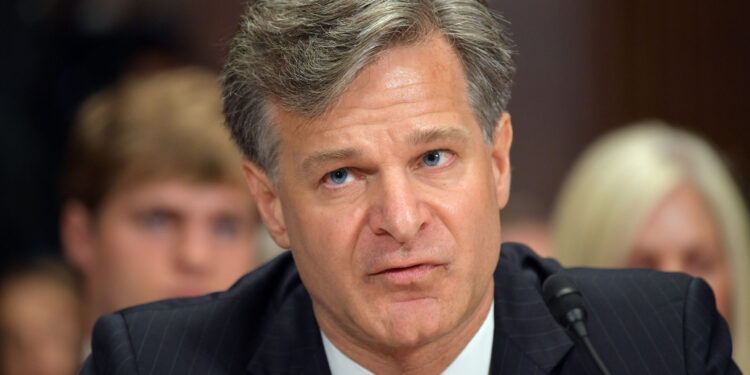FBI Director Christopher Wray told Homeland Security Committee House members Tuesday that the video-sharing app TikTok poses national security threats from the Chinese Communist Party.
Concerns from Wray and the FBI come off the heels of Federal Communications Commission officials urging the U.S. government to ban the app to protect American citizens’ private data, citing issues with controlling the information flow back to Beijing. TikTok officials denounced the federal agency’s accusations, saying FCC officials have no role in the confidential discussions with the U.S. government related to the app.
“We do have national security concerns — at least from the FBI’s end — about TikTok,” Wray said in a hearing focused on Worldwide Threats to the Homeland. “They include the possibility that the Chinese government could use it to control data collection on millions of users. Or control the recommendation algorithm, which could be used for influence operations if they so chose. Or to control software on millions of devices, which gives it opportunity to potentially technically compromise personal devices.”
Chinese tech giant ByteDance owns TikTok, which currently has more than 200 million downloads in the United States — and according to Fox Business, the company must share its data with the CCP upon request, as required by Chinese law.
Wray confirmed that Chinese companies must “do whatever the Chinese government wants them to in terms of sharing information or serving as a tool of the Chinese government.”
“And so that’s plenty of reason by itself to be extremely concerned,” he added.
Vanessa Pappas, a TikTok executive, told U.S. Congress earlier this year that the social media app was making “progress toward a final agreement with the U.S. government to further safeguard U.S user data and fully address U.S. national security interests,” according to Reuters.
Aynne Kokas, professor of media studies and the director of the East Asia Center at the University of Virginia, told NPR that the Chinese government uses TikTok to expand extra-territorial control over digital platforms.
“The Chinese government has allowed for and has encouraged Chinese firms to actually engage in national security data on any data that’s been gathered by a Chinese firm,” Kokas said.
Chinese companies operate several apps used by Americans every day, which has sparked concern among U.S. lawmakers about the effectiveness of banning only one program.
Senator Marco Rubio (R-FL) and Representative Mike Gallagher (R-WI) announced last month they would introduce legislation prohibiting TikTok in the United States, outlining the threat that TikTok and other social media businesses that the CCP effectively manages pose to the nation.
Kokas recently published her new book ‘Trafficking Data: How China is Winning the Battle for Digital Sovereignty,’ which examines how tech ecosystems in the U.S. expand to data-gathering by the Chinese government.
She said Rubio and Gallagher’s bill presents challenges to protecting American citizens’ data privacy.
“When we look at all of these wide-ranging apps that are connected to Chinese firms, it’s actually almost nonsensical to ban just one when we see platforms in areas like precision, agriculture, communications, gaming — all connected to Chinese firms,” Kokas said, “So it’s really important to develop more robust data privacy regulations in the United States to protect users.”
Former President Donald Trump signed an executive order before leaving office that banned the app from the U.S. in 2020. However, the Biden administration later reversed the order and called for a security review of the app.











